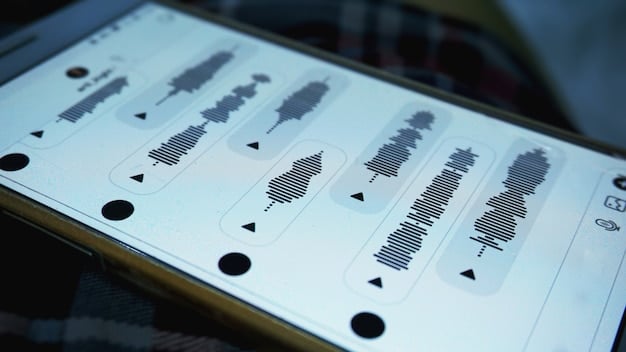Podcast Sponsorships: Secure Lucrative Deals in 2025

Podcast sponsorships offer lucrative revenue streams for creators, but securing these deals in today’s evolving market requires a strategic approach focused on audience engagement, data-driven insights, and building strong relationships with potential sponsors.
Unlocking the revenue potential of your podcast often hinges on securing the right sponsorships. The landscape of podcast advertising is constantly shifting, making it essential to understand the current trends and develop strategies that resonate with both sponsors and listeners. This guide will walk you through the key aspects of podcast sponsorships: How to secure lucrative deals in the evolving market, ensuring you’re well-equipped to thrive in 2025.
Understanding the Podcast Sponsorship Landscape
The podcast industry is booming, presenting numerous opportunities for creators to monetize their content through sponsorships. However, simply having a podcast isn’t enough. You need to understand the dynamics of the sponsorship landscape and tailor your approach accordingly.
Let’s delve into current trends and the evolving demands of sponsors.
Current Trends in Podcast Sponsorships
The podcast advertising market is undergoing rapid transformation, driven by technological advancements and evolving listener behaviors. Staying informed about these trends is crucial for attracting and retaining sponsors.
- Dynamic Ad Insertion (DAI): DAI allows sponsors to target specific listener segments with relevant ads, increasing ad effectiveness and providing valuable data for both podcasters and advertisers.
- Programmatic Advertising: Programmatic ad buying automates the process of purchasing and placing ads, making it easier for sponsors to reach a wider audience and optimize their campaigns in real-time.
- Branded Content and Native Advertising: Instead of disruptive ads, sponsors are increasingly seeking seamless integrations into podcast content through branded segments and native advertising, as it provides a less intrusive and more engaging experience for listeners.
- Data-Driven Insights: Sponsors are demanding more data on audience demographics, listening habits, and ad performance to justify their investment in podcast sponsorships, and they are willing to pay more for it.
What Sponsors are Looking For
Beyond reach and impressions, sponsors are now seeking authentic connections with podcast audiences. They prioritize podcasts that demonstrate a strong understanding of their listeners and can offer measurable results through targeted advertising.
- Targeted Audience: Sponsors want to reach specific demographics, interests, and psychographics, so podcasts with a niche focus should highlight their ability to reach this specific audience.
- Engagement and Authenticity: High engagement rates and authentic host endorsements can significantly increase the value of a podcast sponsorship, since people will be more likely to trust the product or service being advertised.
- Measurable Results: Sponsors expect to see a return on their investment (ROI) through increased brand awareness, website traffic, or sales.
- Brand Alignment: It’s also important to choose podcasts that align with the sponsor’s values and target market.
In conclusion, understanding the evolving landscape and the specific needs of sponsors is crucial for securing lucrative podcast sponsorships. By embracing data-driven insights and prioritizing engagement, podcasters can create valuable partnerships that benefit both parties.
Building a Sponsor-Ready Podcast
Before you can even begin approaching potential sponsors, you need to ensure your podcast is in a position to attract their attention. This involves establishing a strong brand, audience, and consistent content strategy.
Let’s explore the steps to make your podcast attractive to potential sponsors.
Defining Your Brand and Niche
Your podcast’s brand is its identity. It encapsulates your unique voice, values, and target audience. Clearly defining your brand and niche is essential for attracting sponsors who align with your vision.
Knowing your identity can set you apart from the rest.
- Identify Your Target Audience: Who are you trying to reach with your podcast? Understanding their demographics, interests, and pain points will help you tailor your content and attract relevant sponsors.
- Develop a Unique Value Proposition: What makes your podcast different from others in your niche? Highlight your unique perspective, expertise, or format to stand out from the crowd.
- Create a Consistent Brand Identity: Use a consistent visual style, tone of voice, and messaging across all your podcast platforms to build brand recognition and reinforce your identity.
Growing Your Audience
A larger and more engaged audience translates into greater value for potential sponsors. Implement strategies to grow your listener base and foster a sense of community around your podcast.
- Content Marketing: Promoting podcast content on social media platforms using blog posts and engaging visuals.
- Social Media Engagement: Interacting with listeners on social media platforms to encourage interaction, build relationships and expand reach.
- Guest Appearances and Cross-Promotion: Collaborating with other podcasters or industry influencers to reach new audiences and promote your podcast.
Creating High-Quality Content Regularly
Consistently producing high-quality content is crucial for attracting and retaining listeners. A regular content calendar will also help you stay consistent.
Maintaining a consistent schedule will show the viewers what content to expect, and when to expect it.
- Invest in Professional Equipment: Ensuring content quality by using good quality audio equipment and editing software.
- Plan Your Episodes: Developing detailed outlines for each episode to ensure a structured and engaging narrative.
- Engage with Your Listeners: Soliciting feedback and incorporating listener suggestions to improve your content.
In short, building a sponsor-ready podcast requires a multi-faceted approach that encompasses brand development, audience growth, and consistent content creation. By focusing on these key areas, you can position your podcast as an attractive investment for potential sponsors.

Crafting a Compelling Sponsorship Proposal
Once you’ve established a sponsor-ready podcast, it’s essential to craft a compelling sponsorship proposal that showcases your value proposition and demonstrates how you can help potential sponsors achieve their marketing goals.
Let’s dive into the elements of an offer that can’t be refused.
Identifying Potential Sponsors
Start with researching brands and companies that align with your podcast’s theme, values, and target audience. Look for businesses that are already advertising in the podcasting space or have a history of supporting similar content creators.
- Industry-Specific Research: Identifying companies or brands that serve the same market as your podcast.
- Networking: Engage in networking events, attend workshops and talk to companies and brands.
- Competitor Analysis: Analyzing sponsors and brands that are already working with podcasts in your niche.
Showcasing Your Podcast’s Value
Focus on the metrics and insights that are most relevant to potential sponsors. This includes audience demographics, listening habits, engagement rates, and any data that demonstrates the reach and influence of your podcast.
Showing all the reasons why they should choose you.
- Highlight Audience Demographics: Offering potential brands insight and data on your listeners.
- Showcase Engagement Rates: Highlighting engagement through things like social media interaction, download numbers etc.
- Provide Testimonials: Including testimonials or reviews from satisfied listeners or past sponsors.
Customizing Sponsorship Packages
Go beyond offering generic ad spots and develop tailored sponsorship packages that meet the unique needs and objectives of each potential sponsor. This might include branded content segments, host endorsements, social media promotions, or exclusive giveaways.
- Tiered Sponsorship Levels: Offering multiple sponsorship tiers with varying levels of exposure and benefits.
- Custom Content Integration: Developing branded segments or episodes that seamlessly integrate the sponsor’s message into your podcast content.
- Performance-Based Pricing: Experimenting with pricing models that tie sponsorship fees to specific performance metrics, such as website traffic or lead generation.
In summary, creating a winning sponsorship proposal involves identifying the right sponsors, showcasing your podcast’s value, and customizing packages to meet their specific needs. By taking a strategic and personalized approach, you can increase your chances of securing lucrative deals and building long-term partnerships.
Negotiating and Closing Sponsorship Deals
Negotiating sponsorship deals can be a delicate balancing act, requiring you to advocate for your podcast’s value while remaining flexible and accommodating to the sponsor’s needs. Transparency, clear communication, and attention to detail are key elements in this process.
Let’s review best practices for successful negotiation and deal-making.
Setting Your Rates
Base your rates on factors such as audience size, engagement rates, niche, and the type of sponsorship offered. Research industry benchmarks and consider the value you bring to potential sponsors in terms of brand exposure, lead generation, or direct sales.
Being paid what you are worth.
- CPM (Cost Per Mille): Charging sponsors based on the number of listeners (usually in thousands) who hear their ad.
- Flat Fee: Setting a fixed price for a sponsorship package, regardless of performance metrics.
- Performance-Based Pricing: Tying sponsorship fees to specific outcomes, such as website clicks, lead generation, or sales conversions.
Understanding Contract Terms
Thoroughly review all contract terms and conditions before signing any sponsorship agreement. Pay close attention to details such as payment schedules, ad placement, exclusivity clauses, and termination rights. Seek legal advice if needed to ensure a fair and mutually beneficial arrangement.
- Payment Terms: Clarifying payment amounts, due dates, and methods of payment.
- Ad Placement and Creative Control: Defining the placement of ads or sponsorships within your podcast episodes.
- Exclusivity and Non-Compete Clauses: Identifying any restrictions on working with competing brands or sponsors.
Building Long-Term Relationships
View sponsorships as potential long-term partnerships and invest in building strong relationships with your sponsors. Provide regular updates on ad performance, solicit feedback, and be responsive to their needs and concerns.
- Regular Communication: Providing ongoing feedback on their experience, and providing them with their data to reflect upon.
- Be Flexible and Adaptable: Being open to making adjustments to the sponsors program needs.
To summarize, negotiating and closing sponsorship deals requires a strategic approach that balances your podcast’s value with the sponsor’s objectives. This effort can help foster strong relationships in the long term.
Measuring Sponsorship Success
Tracking the right metrics is essential for demonstrating the value of your podcast sponsorships and ensuring sponsors are satisfied with their investment. By measuring key performance indicators (KPIs), you can gain insights into ad performance, listener engagement, and overall ROI.
It is time to dive into the tools you will use.
Key Performance Indicators (KPIs)
Common KPIs can give insight into the success of the campaign.
- Downloads and Listeners: Keeping track of the number of listens and downloads can demonstrate your reach.
- Website Traffic and Conversions: Tracking the website traffic and conversions from sponsored links and coupon codes can provide important information.
- Social Media Engagement: Measuring social media mentions, shares, and comments related to the sponsored content.
Tools and Technologies for Tracking
There are various tools and platforms available for tracking podcast analytics and ad performance.
- Podcast Hosting Platforms: Most podcast hosting platforms offer built-in analytics dashboards that track downloads, listeners, and engagement metrics. Popular options include Libsyn, Buzzsprout, and Podbean.
- Third-Party Analytics Services: Consider using third-party analytics services like Chartable or Podtrac for more advanced tracking capabilities, such as audience demographics, geographic data, and listening behavior.
- Attribution Software: Attribution software helps track the effectiveness of your marketing efforts.
Reporting and Communication
Regularly report on sponsorship performance to your sponsors, providing them with detailed insights into key metrics and overall ROI using data from your analysis.
- Regular Reporting: Providing regular reports to sponsors on campaign performance on a timely basis.
- Easy to Understand Analytics: Providing comprehensive analytics to show off progress.
- Customized Reports: Tailoring reports to sponsor objectives.
In short, measuring sponsorship success is crucial for demonstrating the value of your podcast and building long-term relationships with sponsors. By tracking key performance indicators, utilizing appropriate analytics tools, and providing regular reports, you can ensure sponsors are satisfied with their investment.

Adapting to the Future of Podcast Sponsorships
The podcasting landscape is constantly evolving, so it’s crucial to stay ahead of the curve and adapt your sponsorship strategies to meet future trends and challenges.
It is important to always strive to be ahead of the game.
Emerging Technologies
Emerging trends and technologies are constantly being introduced and adapted for current use. Keeping up to date can increase your chances of utilizing these trends, for the sake of increasing sponsorship deals, and overall revenue.
- AI-Powered Advertising: Artificial intelligence will be able to identify specific data about the audience, and cater the ads to what the listener wants to listen to. Because of this, ads will be a lot easier to monetize.
- Interactive Podcast Formats: Interactive podcasts are becoming increasingly recognized. Allowing listeners to talk directly with the podcaster enables sponsors to build trust.
Evolving Listener Expectations
As listeners become more savvy and discerning, it’s important to address their concerns about ad frequency, relevance, and intrusiveness using new metrics and analytics.
- Transparency and Authenticity: Be transparent about your sponsorships.
- Relevance and Targeting: Make sure you target the correct people with your sponsorship.
- Minimizing Intrusiveness: Avoid overwhelming your listeners with it.
Building a Sustainable Sponsorship Model
As podcasts become ever more widely adopted it is important to have a sustainable model for generating revenue to ensure the longevity of your show.
- Diversify Revenue Streams: Explore multiple revenue streams, to ensure continuous revenue for as long as possible.
- Focus on Long-Term Partnerships: Instead of just focusing on the present, ensure that there is potential for sponsorships which could go on for multiple years.
- Continuously Improve Content Quality: Provide the best quality content for your podcast. Your listeners want to listen to something which is educational and engaging, and can improve their lives.
In conclusion, adapting to the everchanging future of podcasting is essential to ensuring success for sponsors and listeners alike. A diversified revenue stream will ensure a continuous podcast for listeners to engage with.
| Key Point | Brief Description |
|---|---|
| 📈 Data-Driven Insights | Use analytics to understand your audience and provide value to sponsors. |
| 🤝 Strategic Partnerships | Build relationships with sponsors that align with your podcast’s values. |
| 💰 Customized Packages | Offer sponsorship packages tailored to the specific goals of each sponsor. |
| 📣 Promote Engagement | Ensure a two way discussion between you and your audience, by responding to feedback and comments. |
Frequently Asked Questions
▼
Sponsors typically prioritize metrics that directly reflect their return on investment. Key metrics include downloads, listener demographics, website traffic, and conversion rates (e.g., sales or leads generated through the sponsorship).
▼
Start by researching businesses that align with your podcast’s niche and target audience. Look for companies already advertising in the podcasting space or those with a history of supporting similar content creators. Networking events are also good.
▼
Your proposal should highlight your podcast’s value proposition, including audience demographics, engagement rates, and past success stories. Customize the proposal to address the specific needs and goals of each potential sponsor.
▼
Consider factors such as audience size, engagement rates, niche, and the type of sponsorship offered. Research industry benchmarks and assess the value you bring to potential sponsors in terms of brand exposure, lead generation, or direct sales.
▼
Regular communication is a good starting point, by providing regular updates on sponsorship performance, solicit feedback, and be responsive to their needs and concerns. Treat them as partners. Communication is key to maintaining these relationships.
Conclusion
In the dynamic realm of podcasting, securing lucrative sponsorships hinges on strategic planning, data-driven decision-making, and genuine relationship-building. By understanding the evolving landscape, tailoring your pitch of a proposal, and prioritizing engagement, anyone can create lasting partnerships and unlock the full potential of their podcast.





